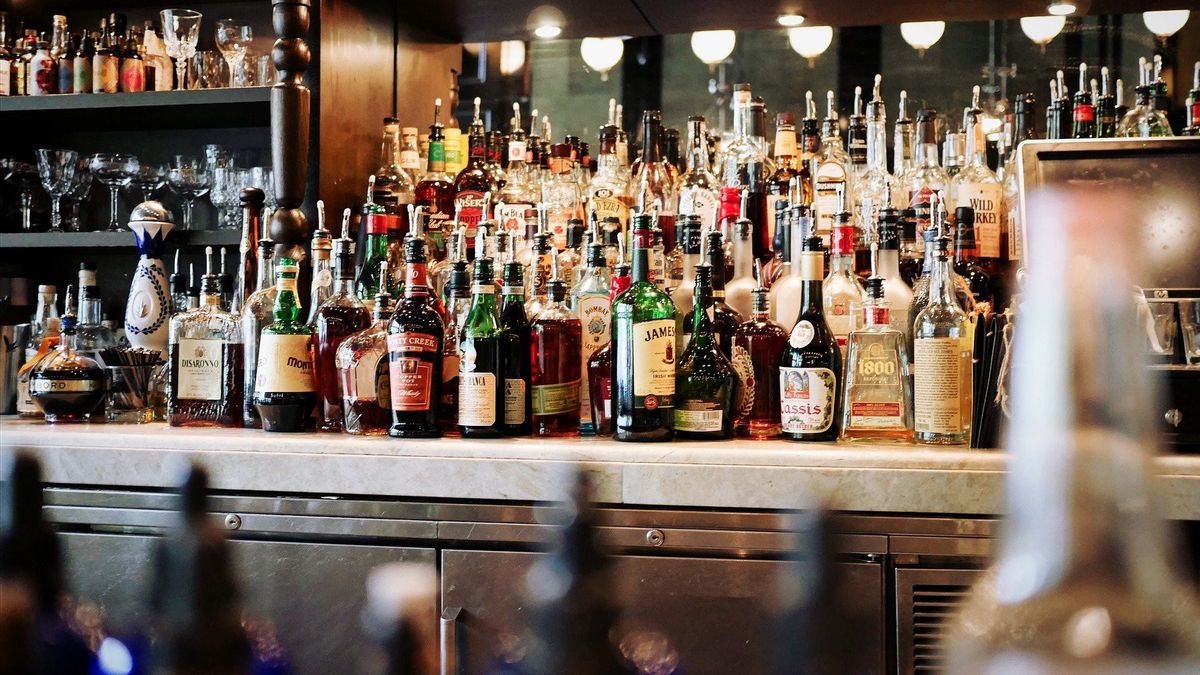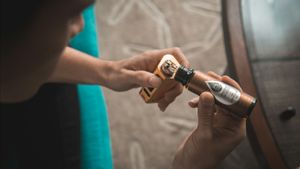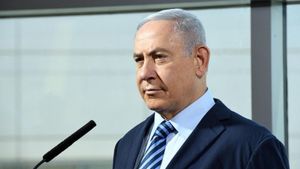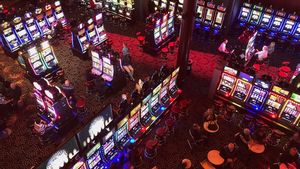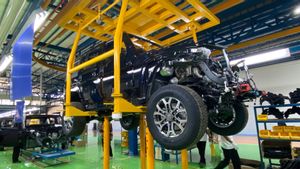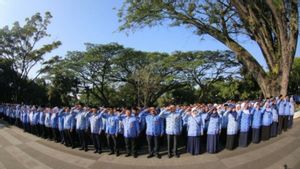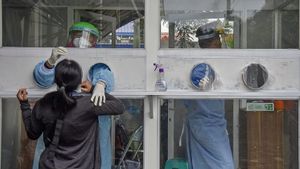JAKARTA - President Joko Widodo has signed Presidential Regulation Number 10 of 2021 concerning the Investment Business Sector which legalizes investment in alcohol or liquor and has the potential to attract foreign capital.
Even though it regulates the issue of the open sale of alcohol in only 4 regions, the pros and cons are still rolling. In fact, there are not a few parties who reject the rule, especially from the politicians.
DenialThe Prosperous Justice Party (PKS) has strongly criticized Presidential Decree No. 10/2021 on the Investment Business Sector, which was signed by President Joko Widodo. This is because the Presidential Decree which legalizes alcoholic drinks from industrial scale to retail trade and street vendors as a list of positive investments (DPI) is considered to have hurt the values of Pancasila and the 1945 Constitution.
According to PKS Faction Chairperson Jazuli Juwaini, the government should have maintained the basic values of the state and the constitution which are applied in policies in various sectors, instead of destroying them in the name of economic pragmatism.
"We remind you not to let state policies lose their way. Maybe the government made mistakes, and it is our obligation in the PKS Faction to remind this policy to be canceled," said Jazuli in his statement, Monday, March 1.
In line with PKS, Chairman of the PAN faction of the DPR RI, Saleh Partaonan Daulay, urged the government to immediately review the Presidential Decree. The reason is, there are articles that have the potential to cause polemics and unrest in the community.
"It must be seriously reviewed and studied. I am absolutely sure that the benefits of investing in the alcohol industry are very small. While the harm is definitely more. If necessary, the Perpres is immediately revised. Articles on alcohol must be issued," Saleh said in a statement. his statement, Monday, February 27.
Meanwhile, Deputy Chairperson of the Indonesian People's Consultative Assembly, Hidayat Nur Wahid, said that Presidential Regulation (Perpres) Number 10 of 2021 not only received rejection from various religious groups such as the Indonesian Ulema Council (MUI), but community leaders in the regions. In fact, in three of the four regions mentioned in the regulation, namely East Nusa Tenggara, North Sulawesi and Papua.
"In Papua, DPD members from Papua and the Religious Working Group of the Papuan People's Council (MRP) have also expressed their rejection, because alcohol is considered to endanger the existence of the Papuan people. The Head of the Manado Regional Police Headquarters also said that alcohol was a trigger for increasing crime in Manado, North Sulawesi. Meanwhile, in NTT, there were also reports of a younger brother's crime who, because he was drunk, had the heart to kill his own brother, "Hidayat said in a statement received by VOI, Monday, March 1.
Therefore, the DPR Commission VIII member in charge of religious affairs reminded President Joko Widodo to review the existence of the Presidential Decree he signed. Because he said, the position of the MRP was very important in the eyes of the Papuan people and in the provisions of the Papua Special Autonomy Law. Where is the province that actually has a Perda on the Prohibition of Alcoholic Drinks.
"Based on the Papua Special Autonomy Law, the MRP is a cultural representation of indigenous Papuans, who have certain powers in the framework of protecting the rights of indigenous Papuans based on respect for customs and culture, empowering women, and strengthening religious harmony," explained the familiar man. called the HNW.
Chairman of the Central Indonesian Ulema Council (MUI) M Cholil Nafis considered that local wisdom cannot be used as an excuse to legalize liquor (miras).
"It cannot be in the name of local wisdom or it has been around for a long time, so it is maintained," Cholil told reporters, Monday, March 1.
According to him, the opening of the alcoholic industry will provide benefits to a few people but will cause great losses for the future of the people.
"I think it must be repealed if you listen to the aspirations of the people, because this is not beneficial for the future of the people. Maybe the benefits are for investment, yes, but the disadvantage is for the investment of the people. Because we forbid it is still circulating, we prevent it from still passing. on the pretext of four provinces, but, right, spread to other provinces, because the investment returns are not proportional to the damage to this nation, "he said.
EndorsementIn contrast to the PKS, PAN and PKB factions in the DPR, Golkar actually supports the issuance of Presidential Decree Number 10 of 2021 concerning the Investment Business Sector.
Christina Aryani, a member of the DPR from the Golkar Party faction, assessed that the Presidential Decree is in line with the spirit of Law Number 11 of 2020 concerning Job Creation which provides convenience for doing business and increases in investment.
"This is in line with the spirit of the Job Creation Law which makes investment easier to boost economic growth," Christina said when contacted by VOI, Monday, March 1.
According to the DPR Commission I member, the Presidential Decree 10/2021 is appropriate to regulate the legality of the liquor industry by paying attention to local culture and wisdom.
"I think this is fitting that specifically for alcoholic drinks, new investment is possible for the North Sulawesi, Papua, NTT and Bali regions," explained Christina.
In line with Golkar politicians, Bali Governor Wayan Koster appreciated the enactment of Presidential Regulation Number 10 of 2021 concerning the Investment Business Sector. However, what is supported is alcohol which is part of local culture and wisdom, one of which is Arak Bali.
He said that Arak Bali, Brem Bali and Tuak Bali are legitimate businesses to be produced and developed.
"On behalf of the government and manners (of the people) Bali, I would like to express my deepest appreciation and gratitude to President Joko Widodo for issuing Presidential Decree No. 10/2021," said Koster as quoted by Antara, Tuesday, March 2.
According to Koster, the Perpres strengthens the existence of Bali Governor Regulation No.1 of 2020 concerning Management of Balinese Fermented Drinks and / or Distillations.
Koster added that the liquor industry containing alcohol, wine alcohol and malt as an open business field for new investment in Bali Province is also a response to the efforts of the Governor of Bali through the Governor of Bali Letter Number 530/2520 / Ind / Disdagperin, dated April 24, 2019.
The letter contained a request for revision facilitation for the development of the traditional alcoholic beverage industry in Bali to increase the income of rural communities in Bali related to Presidential Decree Number 39 of 2014.
"Regarding the request for the Bali Governor's letter, the Minister of Industry of the Republic of Indonesia through the Director General of Agro Industry responded to facilitate the revision of Presidential Decree No. 39/2014 and while waiting for the Presidential Regulation amendment to propose regulations in regional legal products to organize Balinese fermented and / or distilled drinks," explained Koster.
Meanwhile, public policy observer Agus Pambagio said, of the four regions that were allowed to have alcohol distribution permits, only Bali was infrastructure-ready. So, these rules are still relevant outside of the interests of local wisdom.
"What is ready is only Bali. NTT, the tourism infrastructure is incomplete, let alone Papua. North Sulawesi also has traffic jams," said Agus to VOI, Monday, March 1.
If enforced other than the four areas for tourist purposes, Agus said the destination would definitely be deserted if foreign tourists were not allowed to consume alcohol. For example, in Yogyakarta where the area is still not open to the tourist culture like in Bali. So, it is not the main place for foreign tourists to vacation in Indonesia.
"If tourists in Jogja are not allowed to drink, it is lonely in Jogja. We are talking about foreign tourists, not local tourists. Then for example, in Riau Islands there are all kinds of Bintan, not allowed (alcohol), so it's quiet," he explained.
Agus also gave an example of a tourism area that is quiet for foreign tourists because of the many restrictions that apply in the area concerned. For example, when compared to Bali versus Lombok branding.
"Try to see why Lombok is the same as Bali, Lombok (less crowded. Ed). Because there, the beach cannot wear a bikini and then no one can drink," he said.
According to Agus, what people worry about is when people get drunk it will harm others. So that the state must regulate how to implement these rules.
To that end, he suggested that the government learn from the alcohol control system abroad. Where, minors are not allowed to buy alcoholic drinks. This is done by showing the identity of the buyer.
"So it is regulated, for example, if you buy alcohol you have to show your KTP, which means that he is an adult. But who will be watching? What about adulteration?
There are many sources everywhere, how do you supervise them? So in my opinion, increase the supervision, "he said.
Recently the government has set the liquor industry as a positive investment list (DPI). Previously, the alcoholic beverage industry was a closed industrial sector.
The policy is contained in Presidential Regulation (Perpres) Number 10 of 2021 concerning the Investment Business Sector. The regulation which is a derivative rule of Law (UU) Number 11 of 2020 concerning Job Creation has been signed by President Joko Widodo and will take effect as of February 2, 2021.
This rule is a derivative of Law Number 11 of 2020 concerning Job Creation. In Appendix III of Presidential Decree Number 10 of 2021 in numbers 31, 32, and 33 it is stipulated that the liquor industry business sector contains alcohol, wine alcohol and malt open for new investment in the Provinces of Bali, East Nusa Tenggara, North Sulawesi, and Papua. pay attention to local culture and wisdom.
The English, Chinese, Japanese, Arabic, and French versions are automatically generated by the AI. So there may still be inaccuracies in translating, please always see Indonesian as our main language. (system supported by DigitalSiber.id)
